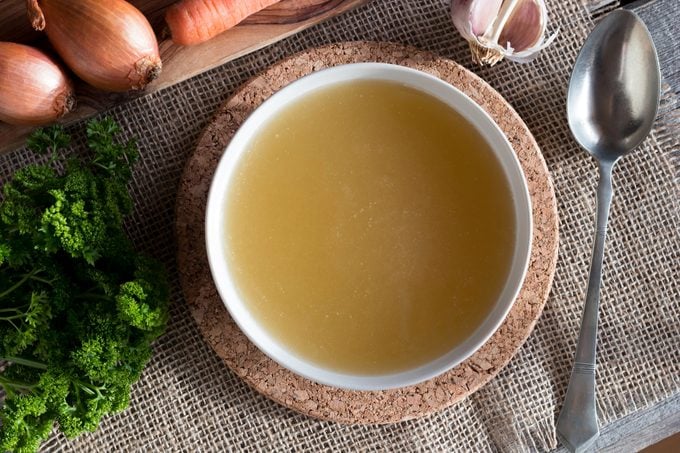Can You Drink Bone Broth While Fasting?
Updated: Mar. 16, 2022
Drinking bone broth can be controversial when it comes to intermittent fasting. Here's what registered dietitians want you to know.
Intermittent fasting and bone broth
In general, what you can drink while intermittent fasting is fairly straightforward. Anything goes during your eating windows, while everything with calories is off-limits when you’re fasting. But how about bone broth? Does drinking bone broth break a fast?
This liquid has become so popular in the past decade that restaurants, like Brodo in New York City, have focused their offerings on bone broth alone. Part of its popularity is due to being relatively low in calories, potentially immune-boosting, and anti-inflammatory. (Here’s what you need to know about the bone broth diet.)
“Bone broth is a bit controversial when fasting,” says Leigh Merotto, RD, a Toronto-based registered dietitian with a focus on metabolic health, digestion/gut health and sports nutrition. “Bone broth does contain small amounts of fat and calories which could break a fast. But on longer fasts—like the 24-hour fast—some fat may be okay as it can keep the body in ketosis.” The goal with intermittent fasting is to enter that same fat-burning state you may have heard about with the keto diet.
Before diving into whether bone broth can break a fast, it’s important to understand what intermittent fasting is.

What is intermittent fasting?
“There are a few different styles of intermittent fasting,” says Ashley Reaver, RD, an Oakland, California-based registered dietitian and the creator of the Lower Cholesterol Longer Life Method. “All incorporate restricting the time frames that you can eat. Instead of one prolonged fast, the fasting time is generally broken up with periods of eating.”
Common intermittent fasting schedules include:
-
Time-Restricted Eating: The most popular and, for many people, the easiest to follow of all intermittent fasting plans, time-restricted eating involves eating within a certain time frame each day. Two common styles: the 16:8 method (fast for 16 hours and eat normally for the next eight hours) and the 14:10 method (fast for 14 hours and eat normally for the next 10 hours).
-
Alternate-Day Fasting: Consume 500 calories every other day and eat as desired on each day in between. “The schedule for calories is roughly 2,000 calories, 500 calories, 2,000 calories, 500 calories,” Reaver says. “The low days are challenging!”
-
The 5:2 Method: Eat as you normally would five days of the week and then fast for 24 hours on two non-consecutive days (like, say, Monday and Thursday).
-
Eat-Stop-Eat: Fast for 24 hours once or twice a week. On the other days, eat as you normally would.
-
The Warrior Diet: Consume all of the calories you desire within a four-hour window each day.
Who should—and shouldn’t—try intermittent fasting
Slower rates of aging and lower risk for certain chronic diseases are among some of the possible intermittent fasting benefits. But these benefits last only as long as you can stick to it. This is exactly why many nutrition experts recommend the more flexible fasting schedules over those that restrict you to 500 or fewer calories per day.
A study published in 2020 in JAMA Internal Medicine found that the 16:8 method of intermittent fasting can lead to weight loss among people who are overweight and obese. But consistently-timed meals offer similar results (and fewer hunger pangs).
As with any diet, check with your doctor or dietitian before starting any intermittent fasting plan.
Going without calories for long periods of time isn’t wise for some groups, such as:
-
Anyone with diabetes or a need to control blood sugar
-
Women who are pregnant, breastfeeding, or trying to get pregnant
-
People with a history of eating disorders or seizure disorders
So, what is bone broth and how do you make it?
Bone broth is made by simmering herbs, vegetables, and the bones and connective tissues of animals (such as cows or chickens) in water for several hours. In cooking terms, this is a “stock.” Nutrition varies based on the ingredients, but here are some nutrition facts for one cup (240 g) of Brodo bone broth:
- Fat: 0.5 g
- Calories: 79
- Sodium: 451 mg
- Carbohydrates: 5 g
- Protein: 10 g
- Iron: 0.3 g
It’s worth noting that the scientific jury is still out on whether bone broth actually lives up to its reputation as an immune booster. A study published in 2019 in the Human Kinetics Journal, for instance, suggests that the amount of amino acids and collagen in many bone broth recipes isn’t high enough to offer wellness wins. And many nutrition experts say you can score more of both—plus more nutrition—by eating protein-rich foods and drinking water.
If you include other ingredients like turmeric, ginger, and vegetables along with the bones, the broth may deliver on some of the anti-inflammatory claims.
Can you drink bone broth while intermittent fasting?
Some intermittent fasters recommend drinking bone broth during fasting windows to feel more satisfied than with water alone. They also say it’s a good way to score some (possible) health benefits. These are likely the same people who allow themselves some wiggle room, often to the tune of 100 calories or less, during fasting windows.
If you want to strictly follow the rules, though, can you drink bone broth while fasting? In a word: No.
“Bone broth has calorie-containing macronutrients like protein and fat,” says Reaver. “The introduction of calories from any source ends the fasting period.” It triggers the release of insulin and ends ketosis.
The final word on intermittent fasting and drinking bone broth
“Any drink that contains calories is technically not permitted during the fasting period,” says Reaver. “Ample intake of water is very important during fasts to avoid dehydration on fasting days or during fasting windows.”
There is, however, an entire bone broth diet that’s actually a form of intermittent fasting. It’s designed to include bone broth during fasting days. On this plan, you follow a paleo diet five days a week and replace snacks with bone broth. Then you consume only bone broth on the other two days. Using this modified fasting style, you can drink bone broth while intermittent fasting.
So far, the medical community has yet to reach a consensus on whether drinking bone broth causes the release of insulin or whether it delivers on its health claims. So until more is known, your best bet is to stick with water, unsweetened tea and coffee, and lemon water during fasting windows. You can then load up your diet during eating windows with well-balanced whole foods.






















